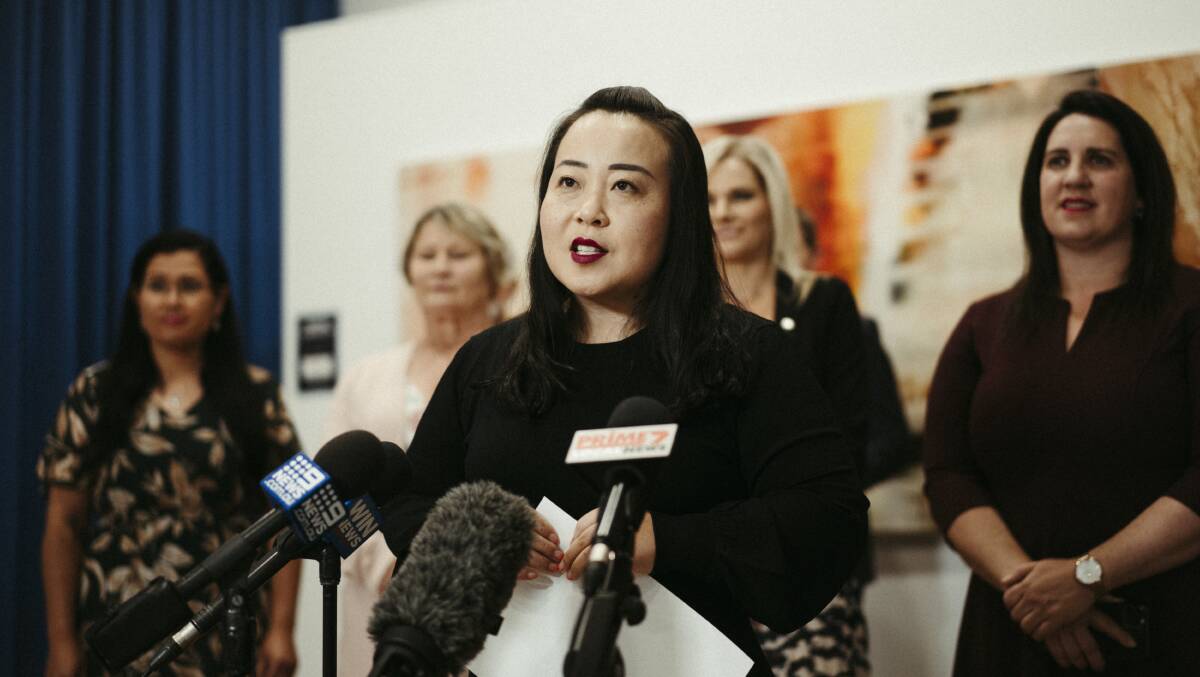
During a panel session on "Why Asian-Australian leadership matters" at last month's second Asian-Australian Leadership Summit, participants were sending questions and comments through the Zoom Q&A box asking why, despite Asian Australians comprising 12 to 13 per cent of the overall Australian population, there is so little representation of Asian Australians in Australian politics.
Subscribe now for unlimited access.
$0/
(min cost $0)
or signup to continue reading
Unbeknownst to the summit co-conveners and participants, Elizabeth Lee became the new leader of the Canberra Liberals the day after our panel discussion, giving life and meaning to the summit's purpose of putting the issue of Asian-Australian representation and cultural diversity leadership on the national agenda.
While we have had a number of Asian-Australian pioneers in Australian politics like Penny Wong, Lisa Singh, Alec Fong Lim, John So, Gladys Liu, Helen Sham-Ho and the late Tsebin Tchen, who have all made history in their own circumstances, Elizabeth Lee has created another piece of Australian political history by becoming the first Asian-Australian leader of a major political party and leader of the opposition in a state and territory government.
Having such representation at the highest levels of leadership generates a tremendous amount of inspiration and motivation for people like me, who have gone through our whole lives wondering if someone who looks like us with similar experiences and stories will ever hold high public office.
Putting the politics aside, it is a privilege when we see ourselves reflected in positions of leadership, authority and influence in our democratic institutions. For Asian Australians, Elizabeth Lee serving as the leader of her political party signals we are coming of age. It is proof of the incredible possibilities that exist for all people in Australia. It also breaks down the stereotypes surrounding Asian Australians being only the workers, supporters and quiet achievers behind the scenes. Asian Australians can also be the leaders of our nation, willing to set the agenda, implement public policy and legislate on behalf of all Australians.
Elected representatives from ethnically and culturally diverse backgrounds inspire those from similar backgrounds to get active and engaged in the political and democratic process. I know this first-hand after achieving my own slice of Australian political history, when I became the first Chinese Australian to serve as a local government councillor and deputy mayor of the City of Monash in 2008 and 2011 respectively. Since my departure in 2016, the residents and ratepayers of Monash have elected two Chinese-Australian candidates and we have seen an increased number of Asian-Australian candidates elected in this year's Victorian local government elections.
READ MORE:
The challenge we have in front of us is to ensure Elizabeth Lee does not become the last. Unlike gender diversity, ethnic and cultural diversity remains an afterthought within Australian political parties. The underrepresentation of Asian Australians in politics remains a barrier to our ability to have our voices heard and perspectives valued.
For Australia to claim to be the most successful multicultural country in the world, our democratic institutions need to be multicultural and reflective of our diversity. This will require people of colour like Asian Australians to step up, as well as require political parties to better understand the makeup of their memberships, identify existing gaps and set targets to support and elevate more non-Anglo-Australian candidates to contest winnable seats.
Having more Asian Australians elected to public office will change the way people view Australia domestically and globally, provide fresh insight, leadership and perspectives as to how policies are formed and delivered, influence how political parties work to support communities and candidates of colour and make Australia's democracy more inclusive and accessible.
Perhaps the biggest impact of Elizabeth Lee's election will be to restore Asian Australians' confidence and reinforce our sense of belonging that we are a part of this country. The emergence of the COVID-19 pandemic, and the racism and xenophobia that came with it, have made some Asian Australians feel like outsiders as their Australianness, identity and sense of belonging have come into question. As Australia recovers from the pandemic, strong leadership is required, no less than in the form of Asian-Australian leadership, to safeguard our cohesive society and economic prosperity.
While we still have a long way to go to bridge the representative gap, Elizabeth Lee's ascent and achievements are a sign of positive things to come as the next generation of Asian Australians strives to consolidate our place in Australia's society and make our mark on our democracy.
- Jieh-Yung Lo is director of the Centre for Asian-Australian Leadership at the Australian National University.

